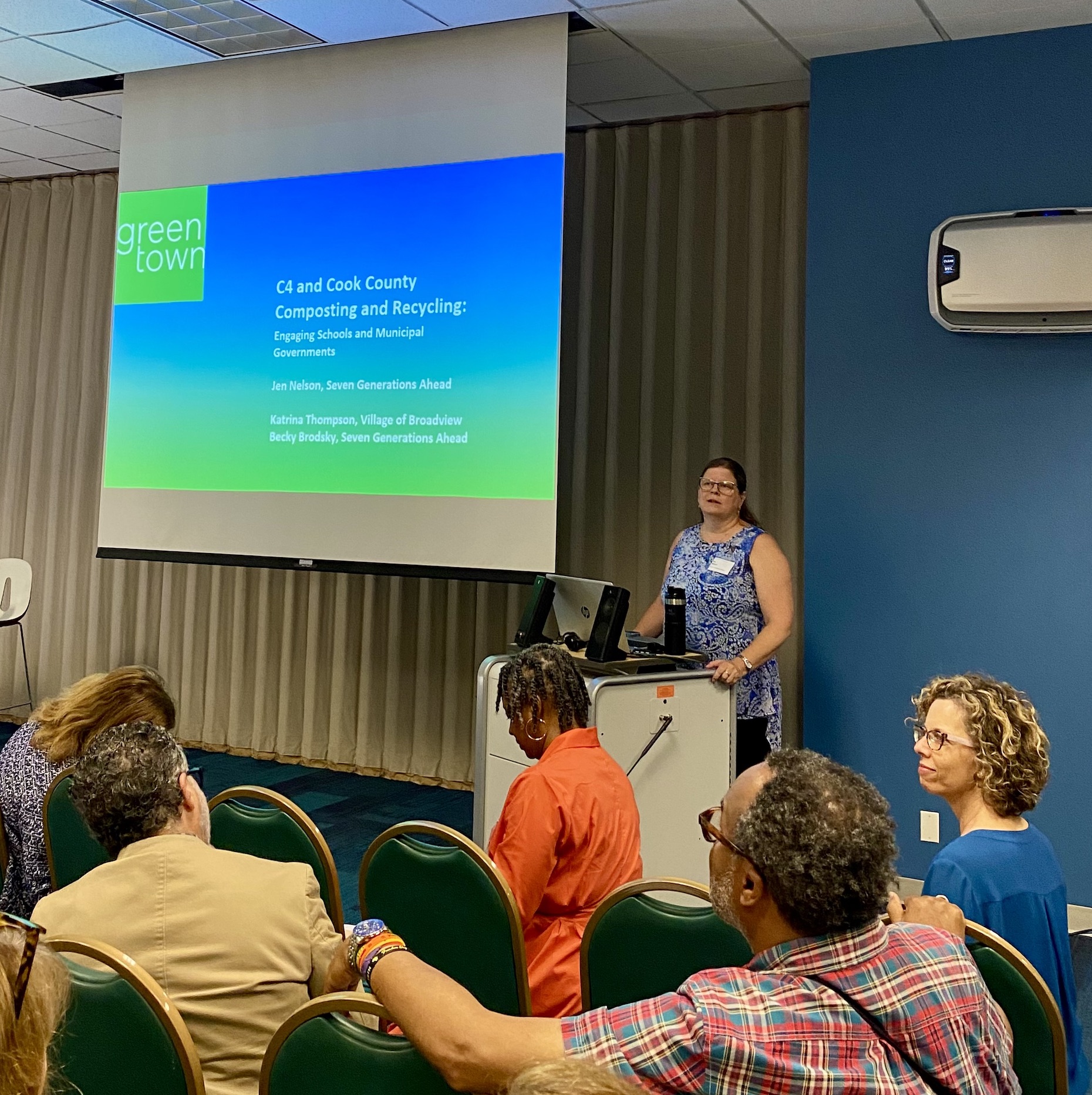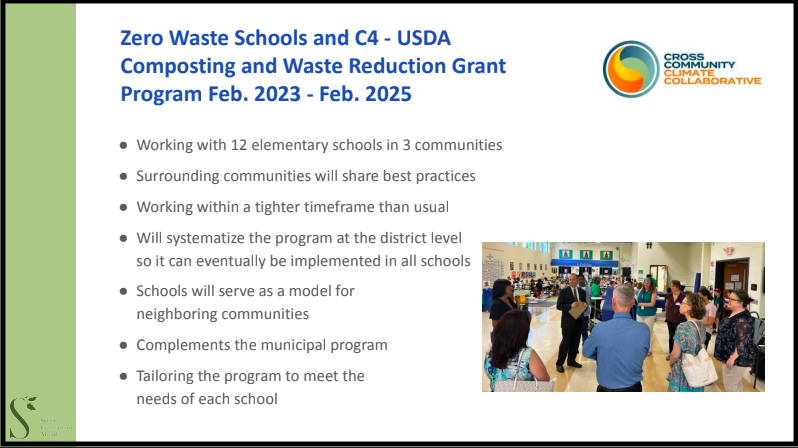Recent heat, drought, and air quality issues in the Chicago area underscored the vital importance of this year’s GreenTown: Climate and Equity conference. Held on June 22nd at Triton College, the conference brought together sustainability advocates from communities throughout Chicagoland and beyond. Among the topics of the day were renewable energy, active transportation, and decarbonization. Seven Generations Ahead’s (SGA) Zero Waste Schools (ZWS) Program Manager Becky Brodsky and SGA Program Director Jen Nelson led an informative session on engaging schools and municipal governments in recycling, composting, and waste reduction initiatives.
The audience of approximately 30 attendees hailed from a variety of Chicagoland suburbs, including Oak Park, Brookfield, Riverside, and as far away as Rockford, Illinois. In the audience were various government officials, including sustainability coordinators and a village forester, as well as school administrators, educators, and design professionals. Nelson and Brodsky engaged this diverse group on the why and how of municipal and school waste reduction programs.
 Nelson drew the audience in by kicking off the session with a powerful graphic connecting the dots between food waste, a major source of methane (a potent greenhouse gas) emissions, and the ever intensifying effects of climate change. She noted that one of the most impactful things an individual can do to make a difference in mitigating the effects of climate change is to reduce food waste. Municipal composting programs are just one of the many ways that communities can get involved in food waste reduction efforts.
Nelson drew the audience in by kicking off the session with a powerful graphic connecting the dots between food waste, a major source of methane (a potent greenhouse gas) emissions, and the ever intensifying effects of climate change. She noted that one of the most impactful things an individual can do to make a difference in mitigating the effects of climate change is to reduce food waste. Municipal composting programs are just one of the many ways that communities can get involved in food waste reduction efforts.
“This is an area where we can all make a difference,” said Nelson. “How often can we really have a big effect on climate solutions?”
She explained that the best approach to food waste reduction is to prevent first, then rescue, and lastly, recycle food scraps (compost). Municipalities can include food waste reduction in their climate plans and require public events to adopt waste reduction strategies. When it comes to rescuing food, municipalities can implement an ordinance supporting food recovery programs and can create incentive or recognition programs for surplus food donation. Lastly, they can implement curbside food scrap collection programs for residents, which greatly reduces the barriers to composting for community members.
Through the Cross Community Climate Collaborative (C4), Nelson is helping to spearhead a municipal food waste reduction project in the communities of Bellwood, Broadview, and Maywood. It will leverage some of the strategies mentioned above and can serve as a model for other C4 communities.
After Nelson’s presentation, Brodsky turned the group’s attention to schools, walking attendees through the many ways schools can make an enormous difference in waste reduction. She began by highlighting the benefits of minimizing waste for both schools and students – including giving students hands-on learning opportunities and a way that they can fight climate change every day by reducing food and plastic waste. About half of all plastics produced are used once then thrown out, and the U.S. generates more plastic waste than any other country – at a staggering 42 million metric tons per year. Add that to the fact that, on average, approximately half of the food served in school cafeterias goes uneaten, schools have a tremendous opportunity to be leaders in waste reduction.
So, what’s the best way to start reducing waste in schools? Don’t create it in the first place.
“We don’t look at recycling and composting as the gold standard,” said Brodsky. “Yes, we should make those waste diversion options available, but it’s even better not to have any waste to divert.”

Reusable food ware, bulk dispensers, and eliminating straws can all be great ways for schools to stop the waste before it starts. Other effective strategies for reducing food waste are the “Offer vs. Serve” method (a provision in the National School Lunch Program that allows students to decline some of the food offered), scheduling longer seated lunch times, and implementing share tables, where students can leave uneaten whole fruit and unopened factory-sealed food items for other students to take. Lastly, lunchroom sorting stations with clear, visible signage for sorting liquids, recycling, landfill, and compost supported by effective schoolwide education are key to a successful zero waste program.
As part of the USDA Composting and Waste Reduction Grant, SGA’s Zero Waste Schools program will implement zero waste programs in 12 schools in three C4 communities. Broadview Mayor Katrina Thompson, who co-leads C4 closed out the session with her thoughts on going zero waste.
“Why are we doing this? It’s real simple. It just makes sense,” she said. “If you have a K-12 school, why wouldn’t you want to bring this into the school?”
But, she also emphasized that, just because it makes sense, doesn’t mean it’s easy. And that’s where having solid support of a collaborative like C4 becomes very helpful.
“It’s so important to work in collaboration with partners and communities, because you can’t do it alone.”
